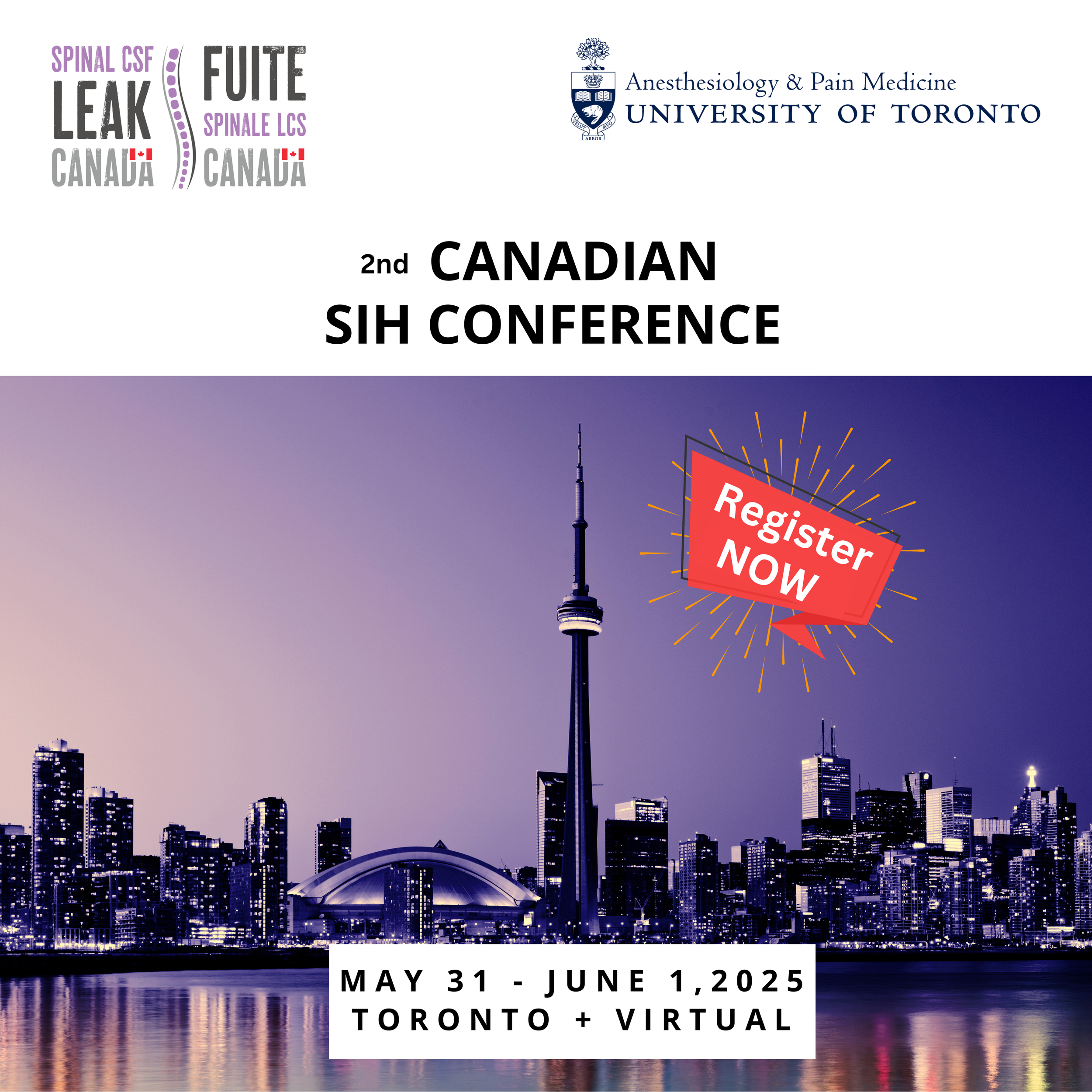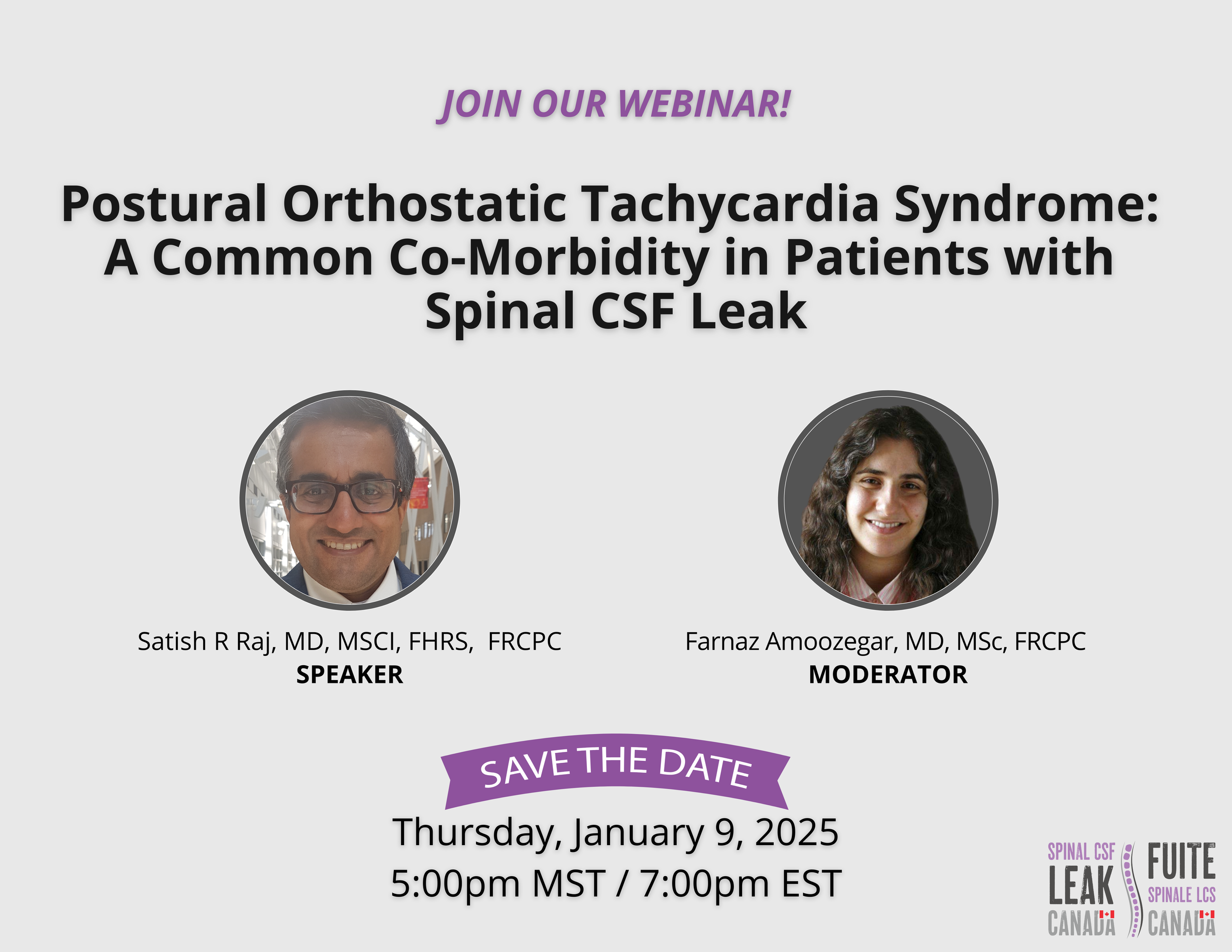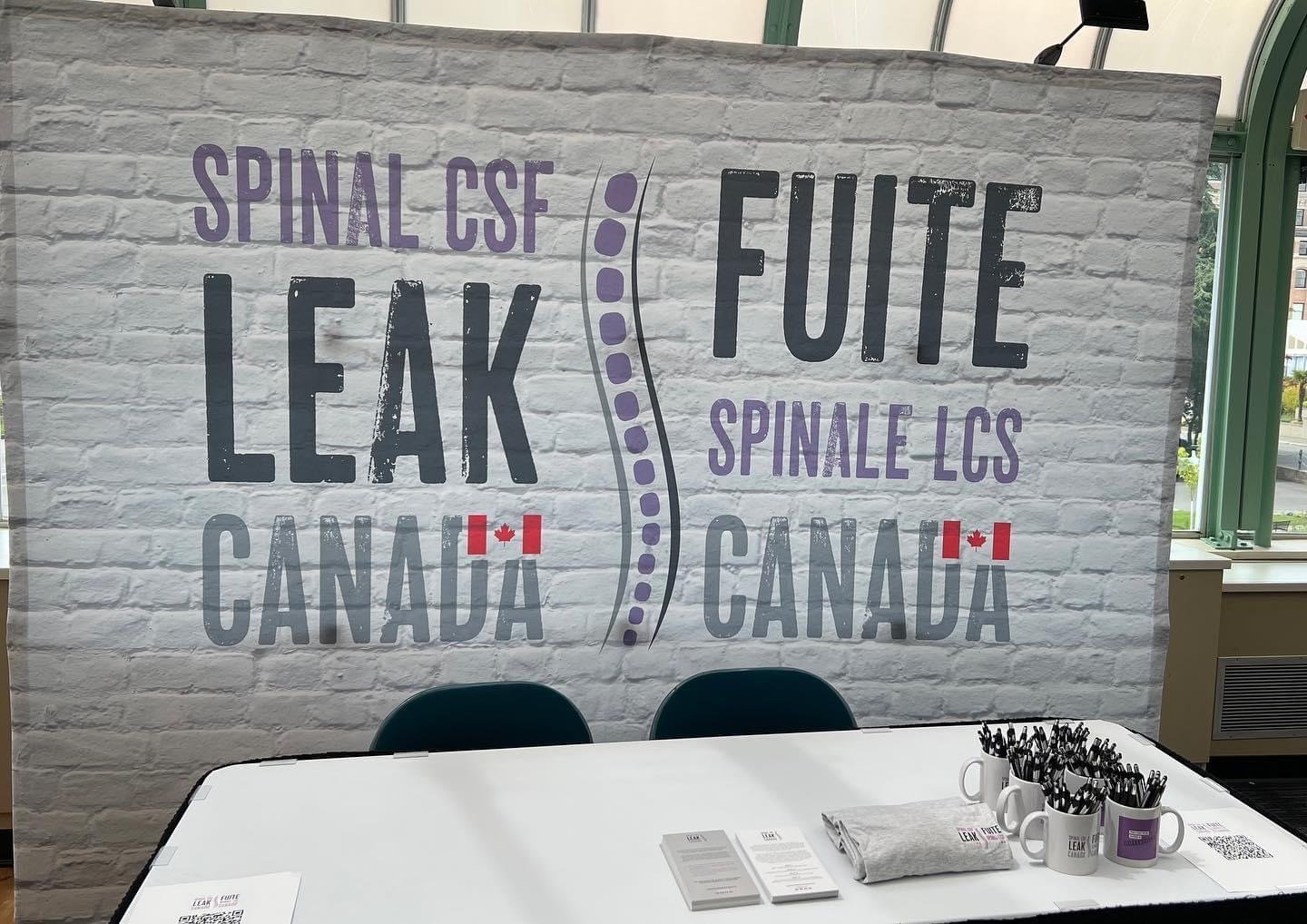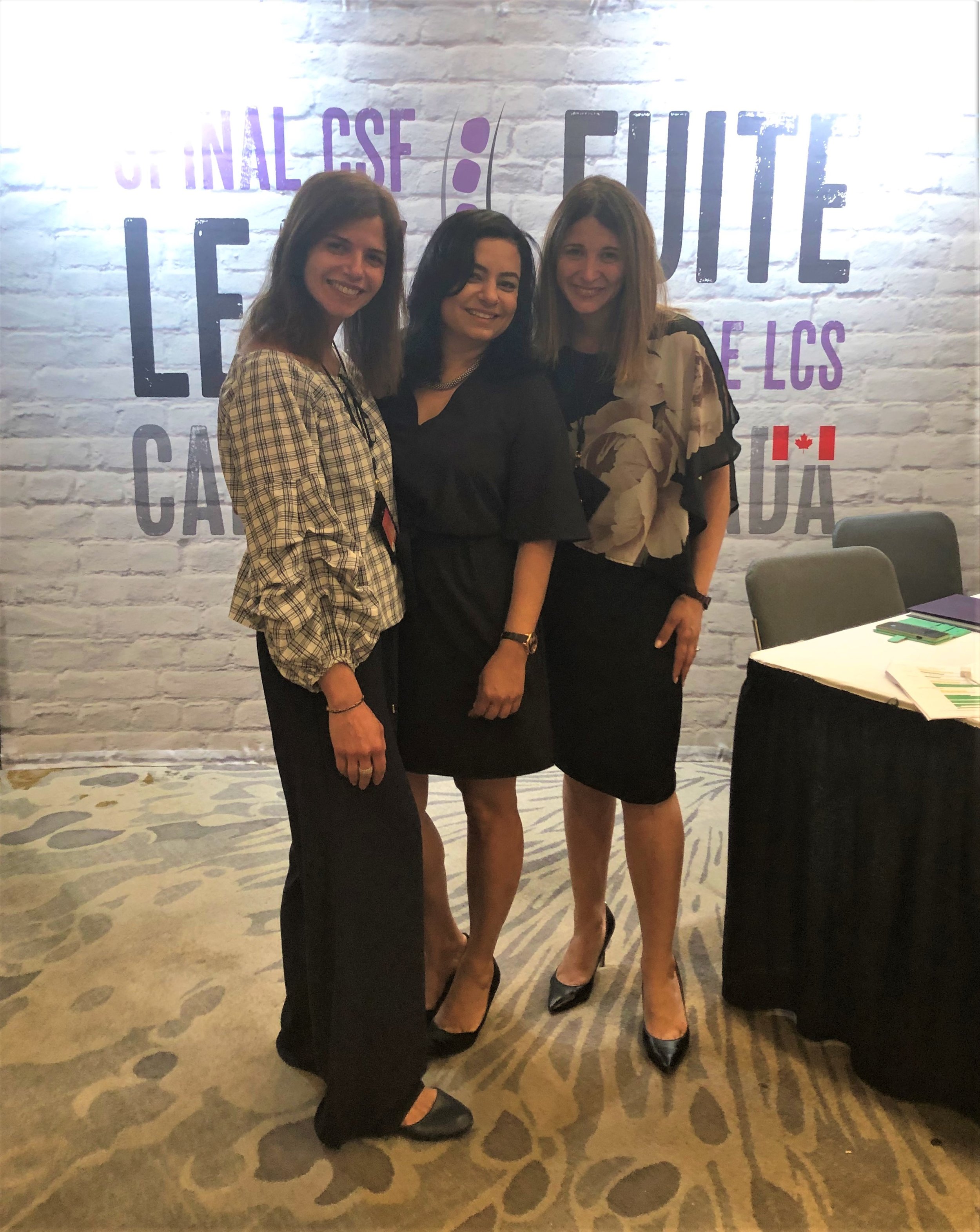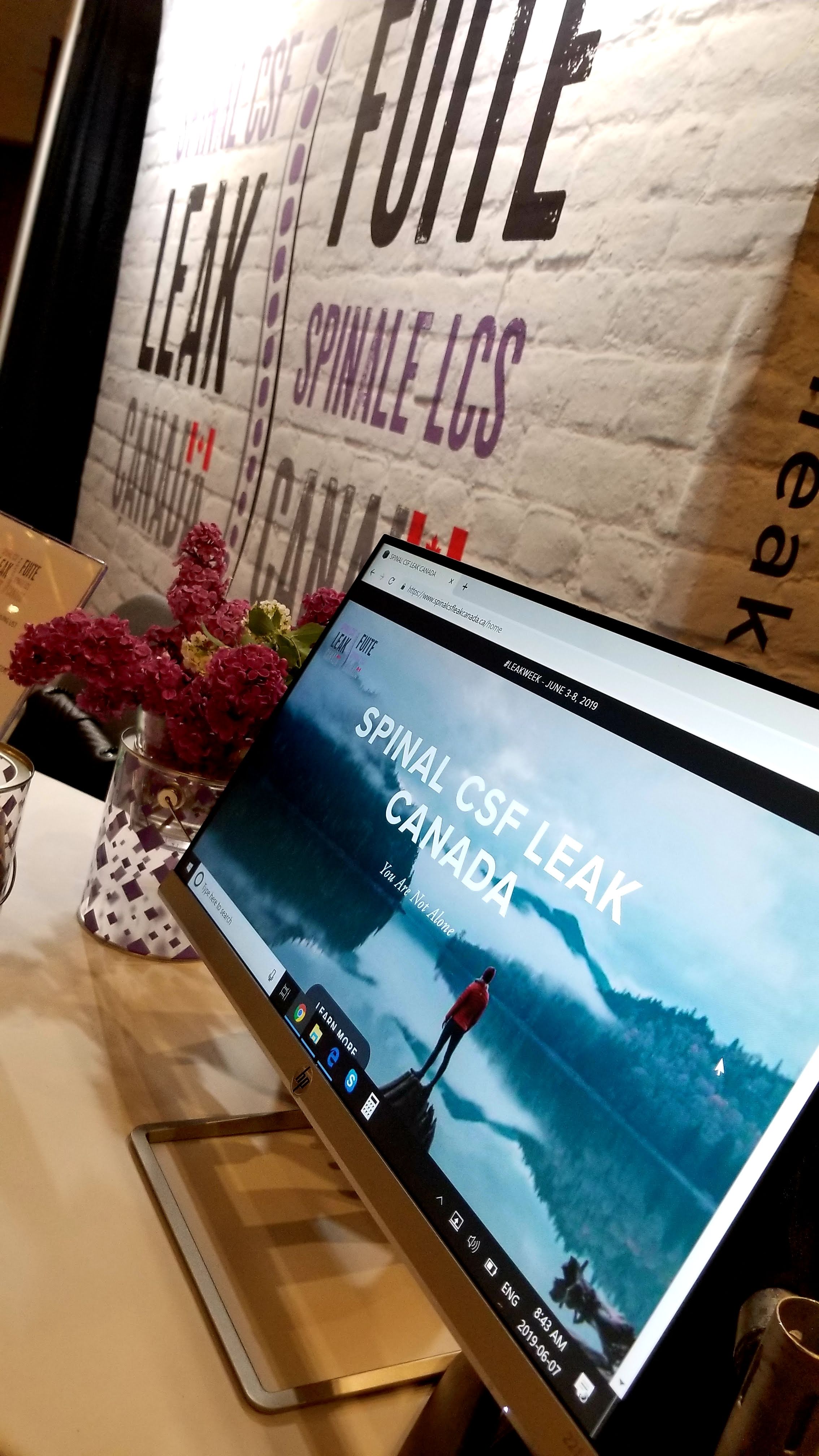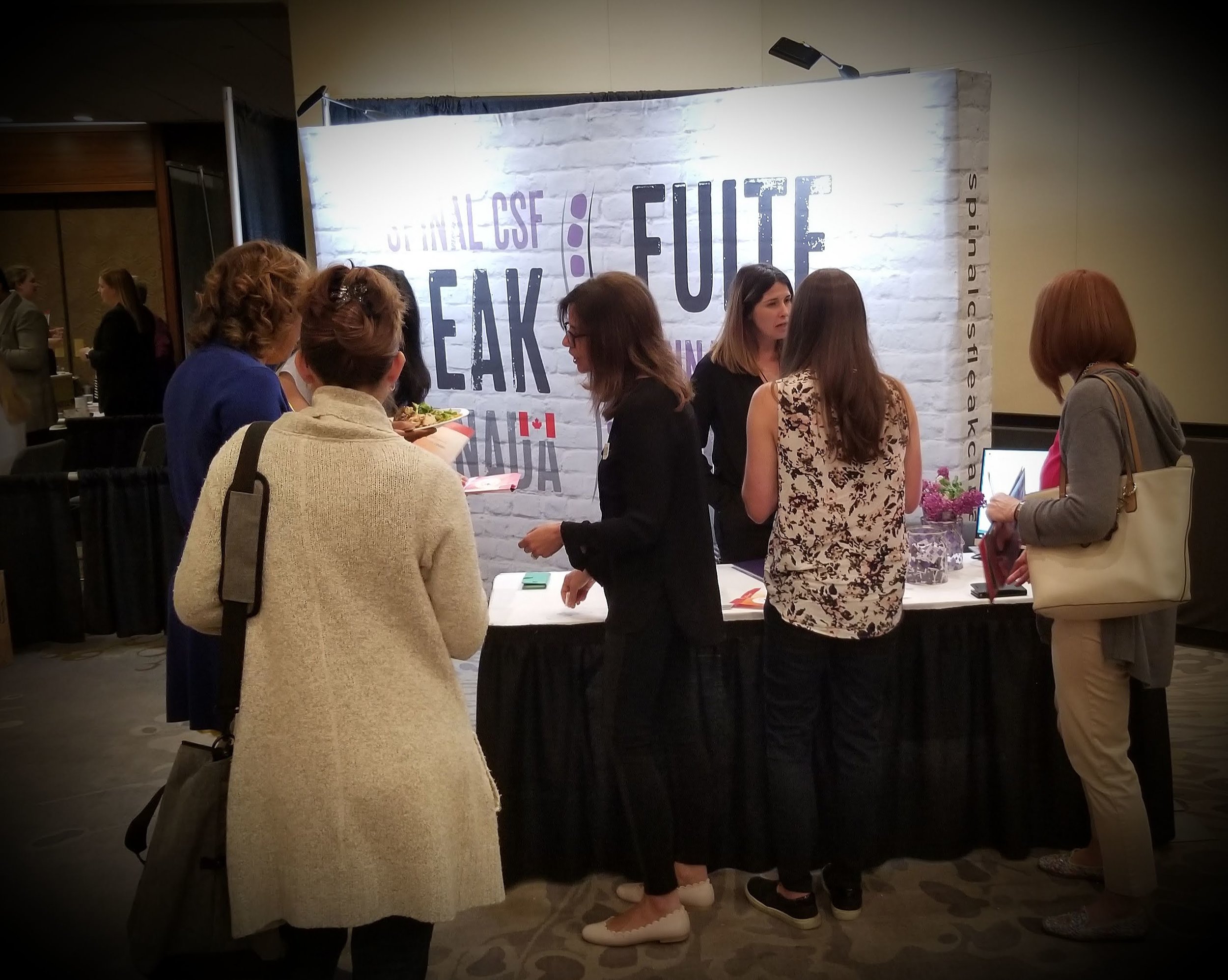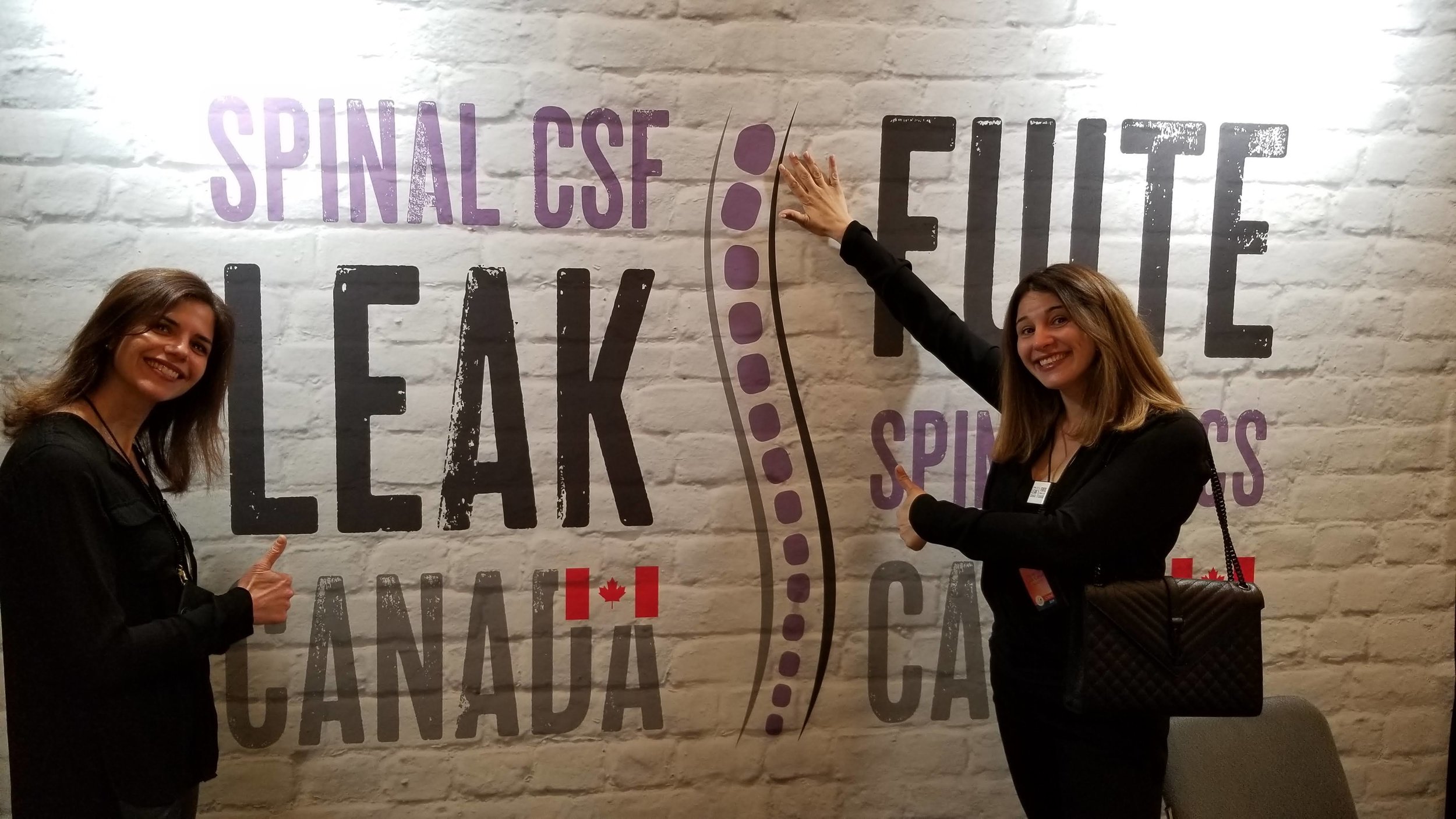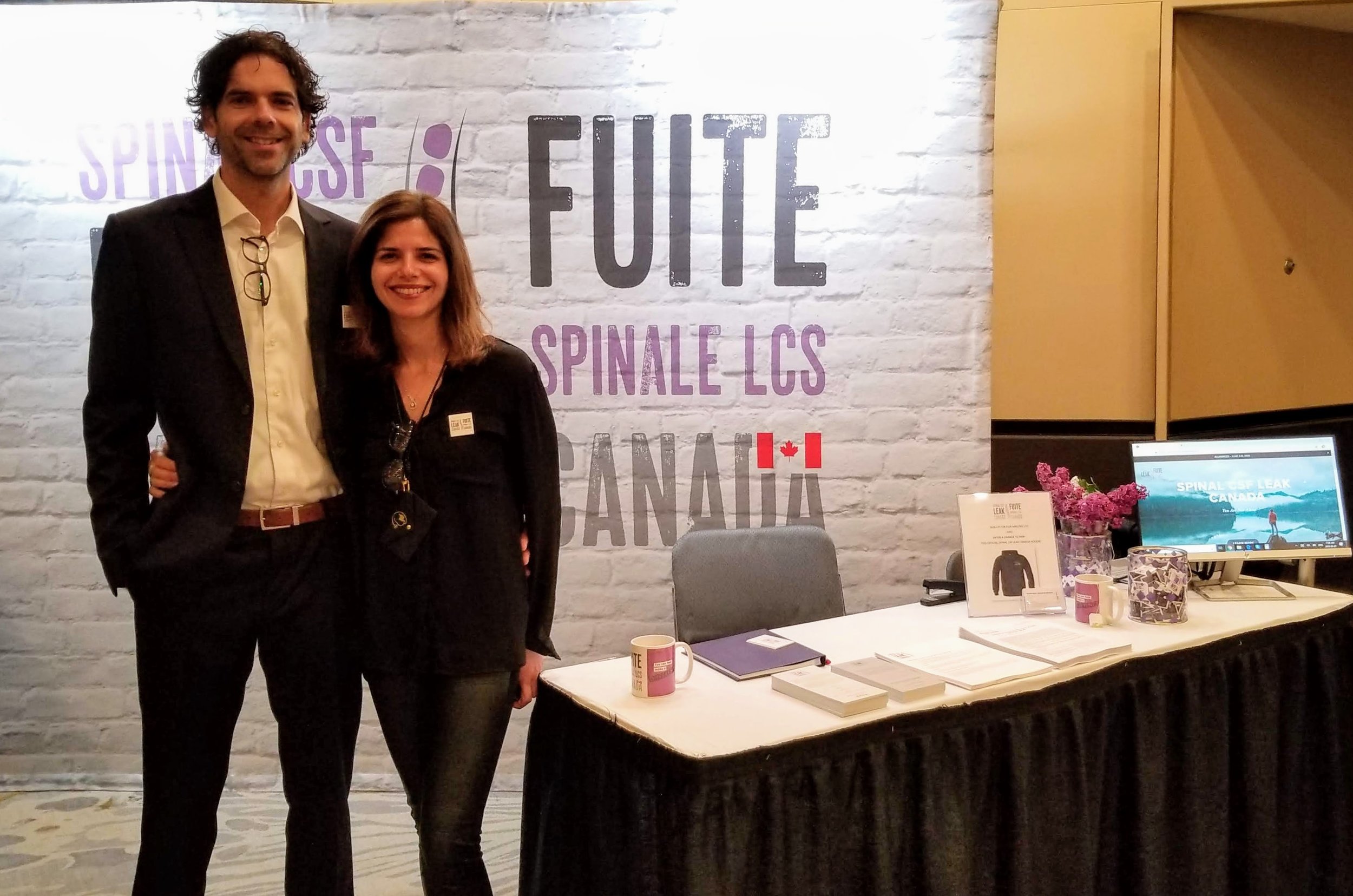Upcoming Events
About The Event
The Canadian SIH conference is organized by the Spinal CSF Leak Canada charity in affiliation with the Department of Anesthesia and Pain Medicine, University of Toronto.
This comprehensive event will cover various aspects of diagnosis and management of Spontaneous Intracranial Hypotension (SIH).
This conference is designed for healthcare professionals from several specialties, as well as patients and other health consumers, to provide education, awareness, and provide the latest evidence-based medicine practices and recommendations for the diagnosis and treatment of SIH. This conference will feature an international faculty with extensive expertise in SIH.
Event learning objectives
Identify typical and atypical clinical symptoms of SIH and apply that knowledge to make a clinical diagnosis.
Use appropriate and optimal diagnostic Imaging to diagnose SIH.
Describe the different diagnostic imaging modalities (MRI, DSM, CT Myelogram, PCCT) used to localize different types of spinal CSF leaks.
Develop multiple approaches for the treatment of SIH (conservative, EBP, fibrin glue, embolization, surgery, medications).
Apply post-treatment management strategies and prevent/manage complications of chronic SIH.
Be familiar with challenges facing Canadian patients & current Canadian research.
Learn from colleagues and experts regarding clinical pearls and pitfalls through interactions and discussions among all participants.
All participants (in-person and virtual) will have the opportunity to actively engage in discussions and spend time in active learning, including roundtable discussions and dedicated Q&A sessions following each section of the conference.
*Please note that this program will be offered in English.
Postural Orthostatic Tachycardia Syndrome (POTS): A Common Co-Morbidity in Patients with spinal CSF Leak
PROGRAM DETAILS
Date: Thursday, January 9th, 2025
Time: 5:00 - 6:00pm (MST) | 7:00 - 8:00pm (EST)
Where: Zoom Webinar
Registration fee: No Charge. Please consider making a donation in lieu of a registration fee. Your support will help us continue our mission to improve the health and lives of patients suffering from spinal CSF leaks by advancing medical research and education on this condition
Overview
This webinar will provide an overview of Postural Orthostatic Tachycardia Syndrome (POTS), as a common comorbidity in patients with spinal cerebrospinal fluid (CSF) leak. POTS is a form of dysautonomia characterized by an abnormal heart rate response with upright position, often accompanied by symptoms like dizziness, nausea, palpitations, and fatigue. POTS affects a broad spectrum of systems, causing orthostatic intolerance and a range of non-orthostatic symptoms. Recent studies indicate that symptoms of POTS and spinal CSF leak often overlap, including orthostatic headache, dizziness, and light-headedness. Notably, orthostatic headache—a hallmark feature of spinal CSF leak —has been reported by a significant percentage of POTS patients. However, while diagnostic criteria for spinal CSF leak emphasize excluding POTS in patients with unexplained orthostatic headaches, the reverse is not as thoroughly addressed in POTS diagnostic guidelines.
This engaging and informative webinar will delve into the diagnosis and treatment of POTS. Our expert speaker, Dr. Satish R Raj, MD, MSCI FHRS FRCPC, is Professor of Cardiac Sciences at the University of Calgary. He is also Service Chief, Arrhythmia Section, in the Division of Cardiology, is Director of the Calgary Autonomic Investigation & Management Clinic, Director of Education at the Libin Cardiovascular Institute, and Former President of the American Autonomic Society. Dr. Raj will discuss key topics related to POTS and dysautonomia, including:
● Diagnosis
● Treatment Approaches
● Monitoring and Tracking Progress
● Exercise and Lifestyle Recommendations
The session will conclude with a 15-20 minute Q&A, allowing attendees to engage with the leading expert in the field and deepen their understanding of managing POTS in the context of spinal CSF leak. This webinar promises valuable insights for clinicians seeking to enhance care for patients affected by these challenging and often interconnected conditions.
*You can submit your questions in advance to info@spinalcsfleakcanada.ca | Subject: Webinar
Past EVENTS
We were excited to exibxit at the sold-out Canadian Headache Society conference, taking place from October 4-6, 2024. A huge thank you to the Canadian Headache Society for giving us the opportunity to be part of their first Canadian Headache Conference and to highlight our mission and initiatives. A big thank you to Dr. Farnaz Amoozegar and Dr. Yasmine Hoydonckx for their relentless efforts to advance the knowledge of Spontaneous Intracranial Hypotension (SIH) within the medical community. Special thanks to Mrs Bahareh Cloutier and Dr. Rosann Seviour of Spinal CSF Leak Canada for their unwavering advocacy to improve the lives of all those suffering from this condition across Canada.
(From left to right) Dr Danny Monsour, Dr Rosann Seviour, Bahareh Cloutier, Dr Farnaz Amoozegar, Dr Yasmine Hoydonckx, Dr Christian Ulrich, Dr Ian Carroll, Dr. Eric Massicotte, Dr Richard Farb, Dr Peter Kranz.
(From left to right) Dr Christian Ulrich, , Dr Ian Carroll, Dr Richard Farb, Dr. Eric Massicotte, Dr Peter Kranz, Bahareh Cloutier, Dr Farnaz Amoozegar, Dr Yasmine Hoydonckx, Dr Rosann Seviour.
Diagnosis and treatment of spinal CSF leak and CSF venous fistula “Algorithmic multimodality approach”
PROGRAM DETAILS
Date: Tuesday, November 14, 2023
Time: 5:00pm - 6: 00pm (EST)
Where: Zoom Webinar
Registration fee: No Charge
Please consider a donation in lieu of registration fee. Spinal CSF Leak Canada is a healthcare-based charitable organization, driven 100% by volunteers and donors. Your donation will help us to continue our mission to improve the health and lives of patients suffering from SIH by assisting in advancing medical research and education relating to the condition.
*You can submit your questions to info@spinalcsfleakcanada.ca | Subject: Webinar
**Please note that this program will be offered in English
Overview
Spontaneous intracranial hypotension (SIH) is a debilitating neurological condition caused by leakage of cerebrospinal fluid (CSF) through the dura mater, the fibrous tissue that contains CSF, either through a dural defect, ruptured nerve root sleeve, or directly into a paraspinal vein (CSF venous fistula (CVF)). SIH affects the dynamics of CSF and leads to a wide range of highly disabling clinical symptoms such as orthostatic headache (head pain, pressure), nausea, vomiting, changes in vision, dizziness or vertigo, changes in hearing, ringing in the ears (tinnitus), a sense of imbalance, neck or shoulder pain, changes in cognition, and other associated neurological symptoms. Many symptoms associated with SIH are orthostatic, meaning that they are worse in the upright position and improve when lying down. Experts agree that symptoms and patient history are extremely important factors for a successful diagnosis. However, diagnosing SIH is often challenging due to the diverse range of clinical manifestations, limited findings through medical imaging, and the fact that a significant portion of patients exhibit normal results through conventional imaging. Therefore, a careful review of patient history and specialized diagnostic tests are often necessary to diagnose SIH and localize the patient’s leak.
There is increasing understanding that identifying the precise location of the CSF leakage or CVF is necessary for effective treatment of SIH. Although our understanding of SIH has increased in recent years and newer imaging techniques have improved to localize the site of a spinal CSF leak, misdiagnosis and/or underdiagnosis remain common. Additionally, some of these techniques may not be available at non-specialized medical centers, leaving numerous patients with inadequate diagnoses and treatment.
This webinar will delve into advanced myelographic imaging techniques which can be used to localize CSF leaks and CVF. We will discuss how clinical history and initial neuroimaging can provide crucial clues in discovering SIH. Additionally, seminar will provide an overview of treatment options. These insights are synthesized within an algorithmic framework, intended to guide physicians in the systematic evaluation and management of patients suspected of having SIH.
Don’t miss this opportunity to gain valuable insights into the complex world of SIH diagnosis and management from a leading expert in the field Dr. Andrew Callen, neuroradiology, director of CU CSF leak program at the university of Colorado. This presentation will be followed by a Q&A session.
PROGRAM SPEAKER
Andrew Callen, MD BIO - Assistant Professor Neuroradiology, Director of CU CSF leak program, University of Colorado.
PROGRAM CHAIR
Yasmine Hoydonckx, MD, MSc, FIPP BIO - Assistant Professor, Department of Anesthesiology and Pain Medicine, University of Toronto.
Reference:
Callen AL, Timpone VM, Schwertner A, Zander D, Grassia F, Lennarson P, Seinfeld J, Lillehei KO, Birlea M, Thaker AA. Algorithmic Multimodality Approach to Diagnosis and Treatment of Spinal CSF Leak and Venous Fistula in Patients With Spontaneous Intracranial Hypotension. AJR Am J Roentgenol. 2022 Aug;219(2):292-301. doi: 10.2214/AJR.22.27485. Epub 2022 Mar 9. PMID: 35261281.
May 19-21, 2023
Spinal CSF Leak Canada was delighted to be presenting an exhibit at the Canadian Women in Medicine (CWIM) Conference.
The CWIM is the largest gathering of Canadian women physicians in the country.
A huge shout out to our directors Dr. Rosann Seviour & Jonathan Cloutier for their dedication and efforts to improve access to care and treatment for those suffering from the debilitating symptoms of #SIH caused by #spinalcsfleaks
Diagnosis and Treatment of Rebound Intracranial Hypertension (RIH) - A Complication of Epidural Blood/Fibrin Patching and Surgery (Treatment for a Spinal Cerebrospinal Fluid (CSF) leak/SIH)
September 20, 2022
SPINAL CSF LEAK OF CANADA | 4:00 PM (ET)
Though rebound intracranial hypertension (RIH) is sparsely reported, it is not an uncommon complication of CSF leak treatment using epidural blood/fibrin patching or surgery. RIH is characterized by a postprocedural elevation of CSF pressure, resulting in a potentially severe headache, nausea, and vomiting, among other symptoms.
Following treatment of a spinal CSF leak, patients that develop RIH will often find they have a reversal of their orthostatic headaches, meaning their headache is improved in the upright position and worse lying down. Many people find the location of the head pain switches from occipital to frontal.
Although RIH headaches following treatment of SIH have been recognized since the 1990s, much uncertainty remains regarding this complication, and the mechanism underlying the phenomenon remains unknown. Studies indicate its occurrence in about one-fourth of patients following treatment of SIH and that it is more common for patients with restriction of cerebral venous outflow. - Rebound high-pressure headache after treatment of spontaneous intracranial hypotension MRV study. Wouter I. Schievink, MD, M. Marcel Maya, MD, Stacey Jean-Pierre, PA-C, Franklin G. Moser, MD, MMM, Miriam Nuño, PhD, and Barry D. Pressman, MD. DOI:https://doi.org/10.1212/CPJ.0000000000000550
The function of CSF production and absorption in patients with a prolonged CSF leak is not fully understood.
There is no consensus regarding the treatment of SIH and the timing to perform EBP.
Although RIH is often self-limiting, symptoms can at times be severe or persist well beyond the immediate posttreatment period. Because the symptoms of RIH may bear some similarity to those of intracranial hypotension and literature reports of RIH are limited, it may be mistaken for refractory intracranial hypotension, leading to inappropriate management. RIH headaches may complicate the treatment of spinal CSF leaks, and little is known regarding risk factors and best treatment options. - Rebound Intracranial Hypertension: A Complication of Epidural Blood Patching for Intracranial Hypotension. P.G. Kranz, T.J. Amrhein, and L. Gray. AJNR Am J Neuroradiol. 2014 Jun;35(6):1237-40. doi: 10.3174/ajnr.A3841.
In severe cases RIH is accompanied by the presence of papilledema, however, in most cases, RIH is present without papilledema. This feature, in addition to the lack of diagnostic radiographic features, makes the diagnosis and treatment of RIH challenging for the experts and the medical community. It is therefore important to emphasize these difficulties to advance research, diagnosis, and treatment for this group of patients.
This webinar will involve a panel of experts who will describe the differential diagnosis of RIH as well as potential treatment strategies and pain management. Panellists will discuss the need for increased awareness regarding RIH and will share their experiences with treating and management of patients suffering from this complication.
Please note that this program will be offered in English.
PROGRAM CHAIR
Yasmine Hoydonckx, MD BIO - Anesthesiologist, Assistant Professor, University of Toronto, Dept. of Anesthesiology and Pain Medicine, University Health Network – Sinai Health and Women’s College Hospital, Toronto, Ontario.
PROGRAM SPEAKERS
(listed alphabetically)
James Khan, MD BIO – Anesthesiologist, Clinician-scientist, Associate Professor of Anesthesiology – Preoperative and Pain Medicine, Mount Sinai Hospital, Toronto
Peter Kranz, MD BIO - Neuroradiologist, Associate Professor - Chief, Neuroradiology Division, Duke University School of Medicine, North Carolina - “Rebound Intracranial Hypertension: What You Need to Know”
PROGRAM DETAILS
Date: Tuesday, September 20, 2022
Time: 4:00 PM (EST)
Where: Zoom Webinar
To register: https://bit.ly/3QL50a1
To donate: www.spinalcsfleakcanada.ca/donate
June 2-4, 2022
Spinal CSF Leak Canada was delighted to be presenting an exhibit at the Canadian Women in Medicine (CWIM) Conference.
The CWIM is the largest gathering of Canadian women physicians in the country.
Post Dural Puncture Headache (PDPH) – Diagnostic and Treatment Strategies for Chronic Iatrogenic Spinal CSF Leaks
April 9, 2022
SPINAL CSF LEAK OF CANADA | 12:00 PM to 2:00 PM (ET)
Orthostatic headaches caused by cerebrospinal fluid (CSF) leak are a well-known complication from lumbar punctures and intrathecal catheter placements. They can also occur secondary to unintended dural perforation during the administration of epidural spinal anesthetic. PDPH is the result of CSF egress at the puncture site.
In many cases, PDPH is a self-limiting condition. However, in some patients the condition does not resolve, and leads to a persistent spinal CSF leak with a debilitating orthostatic headache, widespread pain and other neurological symptoms. These symptoms mirror the symptoms in patients who are experiencing a CSF leak from spontaneous intracranial hypotension.
The long-term, debilitating pain caused by chronic PDPH is often misdiagnosed and under-recognized. It has significant negative impacts on the affected patients’ quality of life. Knowledge of this condition is still sparse, with many medical professionals often believing cases are self-limiting. The features of these types of leaks, including their ability to evade imaging differ from spontaneous cases. This makes the diagnosis and treatment challenging for the experts and medical community.
It is important to emphasize these difficulties to advance research, diagnosis and treatment in this group of patients. Most cases of PDPH can be resolved through appropriate diagnostic and treatment management, especially if undertaken early. Additionally, the prevalence of PDPH may be mitigated by use of specific types of needles during lumbar punctures and neuraxial anesthesia.
This webinar will involve a panel of experts who will discuss the clinical characteristics and long-term consequences of chronic PDPH, as well as diagnosis, treatment options, and outcomes. Panelists will discuss the need for increased awareness regarding the different needle types used during procedures that involve a dural puncture, and will share their experiences with treating complicated post-dural puncture headache patients.
Please note that this program will be offered in English.
PROGRAM CHAIR
Eric Massicotte Bio, MD, MSc, MBA, FRCSC, Associate Professor of Neurosurgery, University of Toronto - Staff Neurosurgeon, University Health Network - Director of Undergraduate Education for Neurosurgery - Medical Director, Concussion Program Altum Health - Medical Director, Back & Neck Program Altum Health, Toronto, Ontario.
PROGRAM SPEAKERS
Farnaz Amoozegar Bio, MD, MSc, FRCPC, Clinical Associate Professor of Neurology, University of Calgary and Hotchkiss Brain Institute, Dept. of Clinical Neurosciences, Cumming School of Medicine, Calgary, Alberta. PDPH - Clinical perspective from the Neurologist's viewpoint
Ian Carroll Bio, MD, MSEpi, Associate Professor of Anesthesiology, Preoperative and Pain Medicine Stanford Headache Clinic, Stanford University School of Medicine. Moving towards a differential diagnosis of the Chronic post puncture headache: considerations for patching
Christian T Ulrich Bio – (Bio in German), PD, MD Neurosurgeon and SIH expert from the Department of Neurosurgery Lindenhosfspital Bern, Switzerland. Chronic Iatrogenic Spinal CSF Leak: Diagnostic and Treatment Options - a European perspective
Wouter I. Schievink Bio, MD, Professor of Neurosurgery, Director of Microvascular Neurosurgery Program, Director of Cerebrospinal Fluid Leak Program - Department of Neurosurgery Cedars-Sinai Medical Center, Los Angeles, California. Surgery for chronic iatrogenic spinal CSF leak: from bleb to SLEC
PROGRAM DETAILS
Date: Saturday, April 9, 2022
Time: 12:00 PM to 2:00 PM (ET)
Where: Zoom Webinar
Registration Cost: Donations are appreciated
Spinal CSF Leak Canada is a 100% volunteer-run charity, a donation will help advance our cause.
NATIONWIDE EXPERT PERSPECTIVES ON ACCESS TO CARE FOR SIH/SPINAL CSF LEAK PATIENTS
June 12, 2021 SPINAL CSF LEAK OF CANADA | 12:00 PM to 1:30 PM (ET)
Spontaneous intracranial hypotension (SIH) is a debilitating and often invisible medical condition resulting from a spontaneous spinal cerebrospinal fluid (CSF) leak. Under-diagnosis and/or misdiagnosis of a spinal CSF leak/SIH is common. Some patients experience the resolution of their symptoms without the need for care, but many require more definitive treatment including multiple patching procedures (blood and/or fibrin) and sometimes surgery. The diagnosis, treatment and care of spinal CSF leaks necessitate an experienced, multidisciplinary team requiring collaboration between neurology, neuroradiology, anesthesiology and neurosurgery departments. A multidisciplinary program model is needed in each Canadian province to properly assist in addressing the condition. Currently, such programs do not exist in Canada. Join us in a roundtable discussion format as our experts from across Canada: - Provide their perspectives on the diagnosis, treatment and care of SIH patients; - Highlight the challenges and limitations they face; - Explore potential developments and progress relating to better care for SIH patients; - Compare and contrast Canadian and American models; and - Examine how experts can collaborate to improve care for SIH patients.
Please note that this program will be offered in English.
PROGRAM CHAIR
Yasmine Hoydonckx, MD, FIPP, Assistant Professor, University of Toronto, Dept. of Anesthesiology and Pain Medicine, University Health Network – Sinai Health and Women’s College Hospital, Toronto, Ontario.
Dr. Yasmine Hoydonckx is an Assistant Professor in the Department of Anesthesia and Pain Medicine at the University of Toronto. She is also a Staff Anesthesiologist and Pain Physician at Toronto Western Hospital, Women’s College Hospital and Sinai Health System. She completed her medical school and anesthesia residency training in Belgium, followed by fellowships in Critical Care Medicine and Chronic Pain management, in Belgium and at the University of Toronto. She obtained the Fellowship in Interventional Pain Practice (FIPP) certification through examination from the World Institute of Pain (WIP) and she is now a member of the Board of Examiners for this examination. Her clinical and research interests focus on advanced treatments for chronic pain including interventional treatments such as image-guided procedures and neuromodulation. She is also leading the Craniofacial Pain Program at the Toronto Academic Pain Medicine Institute (TAPMI). Her research focuses on the evaluation and development of new strategies in the treatment of complex craniofacial and neuropathic pain syndromes. She has published on the role of new modes of spinal cord stimulation for the treatment of Complex regional pain Syndrome (CRPS) and the role of ultrasound-guided (steroid) injections for chronic pain syndromes. She has leadership roles in national pain organizations including being a member of the Board of the Canadian Neuromodulation Society. She has lectured and taught at national and international pain conferences and workshops. She is passionate about developing, evaluating and implementing strategies to improve care for patients with pain. She is currently pursuing a Master in Clinical Epidemiology and Health Care Research at the Institute of Health Policy Management and Evaluation (IHPME) at the University of Toronto.
PROGRAM SPEAKERS
(listed alphabetically)
Farnaz Amoozegar, MD, MSc, FRCPC, Clinical Associate Professor, University of Calgary and Hotchkiss Brain Institute, Dept. of Clinical Neurosciences, Cumming School of Medicine, Calgary, Alberta.
Dr. Farnaz Amoozegar is a neurologist and clinical associate professor at the University of Calgary. She completed undergraduate studies and her medical training at the University of Calgary, followed by a neurology residency at the University of Ottawa. She then returned to Calgary and completed subspecialty training in the area of Headache and Facial pain with Dr. Werner Becker. Over the next few years, her interest in clinical research led her to complete a Master’s degree in Clinical Epidemiology. Currently, Dr Amoozegar practices as a neurologist and headache specialist at the University of Calgary and the Calgary Headache Assessment and Management Program. In addition to clinical practice, she is heavily involved in clinical research, including investigator-initiated and industry-sponsored clinical trials, cohort studies, and a registry for Spontaneous Intracranial Hypotension. She is also involved in teaching of fellows, residents and medical students in various settings. Dr. Amoozegar is a member of the Medical Advisory Team of Spinal CSF Leak Canada.
Ian Beauprie, MD, FRCPC, Associate Professor, Medical Director, Dept. of Anesthesia, Pain Management & Perioperative Medicine, Dalhousie University, Halifax, Nova Scotia.
Dr. Ian Beauprie is affiliated to Department of Anesthesia, Pain Management & Perioperative Medicine, Dalhousie University. Dr. Ian Beauprie is currently providing services as Professor. Dr. Ian Beauprie has authored I145and co-authored multiple peer-reviewed scientific papers and presented works at many national and International conferences. Dr. Ian Beauprie contributions have acclaimed recognition from honourable subject experts around the world. Dr. Ian Beauprie is actively associated with different societies and academies. Dr. Ian Beauprie academic career is decorated with several reputed awards and funding. Dr. Ian Beauprie research interests include Anesthesia, Pain Management.
Richard Farb, MD, FRCPC, Associate Professor, University of Toronto, Director, Mount Sinai Hospital, Dept. of Medical Imaging, Division of Neuroradiology, Mount Sinai Hospital Toronto, Ontario.
Dr. Richard Farb is an interventional and diagnostic neuroradiologist specializing in the treatment of patients with brain vascular disorders, especially brain aneurysms, carotid artery disease and acute stroke. His research interests include stroke imaging and neurovascular MR angiographic techniques. He is an assistant professor at the University of Toronto. He teaches and supervises medical students, residents and clinical fellows.
Dr. Farb is a member of the Medical Advisory Team of Spinal CSF Leak Canada.
James Khan, MD, FRCPC, Assistant Professor, University of Toronto, Dept. of Anesthesiology and Pain Management, University Health Network – Mount Sinai Hospital, Toronto, Ontario.
Dr. James Khan is an Anesthesiologist and Pain Physician at Mount Sinai Hospital at the University of Toronto. He the Research Chair for the Pain Council in the Department of Anesthesia and Pain Medicine. His anesthesia training was at the University of Toronto and Pain medicine training at Stanford University, where he trained closely with experts such as Dr. Ian Carroll learning the medical and interventional management of Spontaneous Intracranial Hypotension. He has a general pain practice and is involved in the management of CSF leak patients.
Elizabeth Leroux, MD, FRCPC, Associate Professor, Dept. of Neurology, Brunswick medical center, Montreal, Quebec.
Dr Elizabeth Leroux did her neurology training at University of Montreal. She did a two-year fellowship in Paris at the Emergency Headache Center. She directed the headache clinic of University of Montreal, then the CHAMP multidisciplinary program of the University of Calgary. She currently practices in Montreal at the Brunswick Medical Center. Dr Leroux is the president of the Canadian Headache Society and the founder of the Migraine Quebec and Chair of Migraine Canada. She is involved in migraine advocacy. Current interests include therapeutic education for migraine, impact of migraine on work, and cluster headache.
Eric Massicotte, MD, MSc, MBA, FRCSC, Associate Professor, University of Toronto - Staff Neurosurgeon, University Health Network - Director of Undergraduate Education for Neurosurgery - Medical Director, Concussion Program Altum Health - Medical Director, Back & Neck Program Altum Health, Toronto, Ontario.
Dr. Eric Massicotte, A graduate of the University of Ottawa School of Medicine in 1995, Dr. Massicotte entered the Neurosurgical Training Program at the University of Manitoba immediately after. He transitioned to the University of Toronto for his senior years. During his time in Manitoba Dr. Massicotte completed a Master in Science with the department of surgery. His research focused on white matter changes in the rat model under the supervision of Dr. Marc Del Bigio. He became a Fellow of the Royal College of Physicians and Surgeons of Canada in 2001. In order to further his interest in spine he under took a fellowship at the Toronto Western Hospital under the direction of Dr. Fehlings. The complex spine fellowship also provided him time with Dr. Lewis and Dr. Rampersaud.
He is now Associate Professor in the Department of Surgery, and member of the Division of Neurosurgery at the Toronto Western Hospital. His clinical practice focuses on spine with research interests in outcome measures and medical education. Dr. Massicotte has been appointed medical director for two programs at Altum Health, Back & Neck and Concussion. The latter was an innovation started in collaboration with Dr. Charles Tator.
Patrick Nicholson, MD, FRCPC, Assistant Professor, University of Toronto, Dept. of Medical Imaging - Division of Neuroradiology, Toronto Western Hospital, Toronto, Ontario
Dr. Patrick Nicholson is an Interventional and Diagnostic Neuroradiologist. Special interests in endovascular treatment of neurovascular diseases, robotic endovascular surgery and investigation and treatment of disorders of CSF circulation (including CSF leaks/SIH and idiopathic intracranial hypertension (IIH)).
Rosann Seviour, MD, MSc, FRCPC , Family Physician, St. John’s Newfoundland, Medical Officer of Health
PROGRAM DETAILS
Date: Saturday, June 12, 2021
Time: 12:00 PM to 1:30 PM (ET)
Where: Zoom Webinar
Registration Cost: No Charge
Register in advance for this webinar:
https://us02web.zoom.us/webinar/register/WN_y5y5PBqeRTKI0k7OOBfrBA
Event SPONSORS & IN-KIND DONORS
Spinal CSf Leak Canada is happy to present the first SIH virtual conference in Canada in partnership
with
The ILC Charitable Foundation.
PAIN | SHEDDING LIGHT ON INEQUITIES OF HEALTH
PROGRAM
This conference has been awarded Continuing Professional Development credits which are summarized as follows:
- College of Family Physicians of Canada = Mainpro+: 1 credit/1hour & Group Learning: 6.0 credits/6 hours
-Royal College Maintenance of Certification Section 1 = 6.0 credits/6 hours
PRESENTERS
Farnaz Amoozegar, MD, MSc, FRCPC, Clinical Associate Professor, Dept Clinical Neurosciences, Cumming School of Medicine, University of Calgary and Hotchkiss Brain Institute
Ian Carroll, MD, Anesthesiology, Associate Professor of Anesthesiology, Perioperative and Pain Medicine (Adult Pain) at the Stanford University Medical Center
Clair Francomano, MD, Medical & Molecular Genetics, University of Indiana
Linda Gray-Leithe, MD, Neuroradiology, Duke University, Associate Professor of Radiology at Duke University Medical Center Durham, NC
Philip Peng, MD, MBBS, FRCPC, Founder (Pain Medicine), Professor, Department of Anesthesiology and Pain Management, UHN, Sinai Health Network, Women’s College Hospital, University of Toronto
Wouter I. Schievink, MD, Professor, Neurosurgery, Director, Microvascular Neurosurgery Program, Cedars-Sinai, Los Angeles, CA
Rosann Seviour, MD, MSc Epi, FRCPC, Family Physician, St. John’s Newfoundland & Labrador
Peter Vadas, MD, PhD, Allergist & Clinical Immunologist, University of Toronto
EVALUATION FORMS
If you attended the conference 2020, Please Complete the Evaluation Forms and email to:
info@spinalcsfleakcanada.ca and/or
info@theilcfoundation.org
FEBRUARY 8, 2020 - LOS ANGELES, CA
Co-Founders Azadeh Nourbakhsh and Bahareh Cloutier proudly represented Spinal CSF Leak Canada at the 2020 Intracranial Hypotension Symposium hosted by Cedars-Sinai iin partnership with Spinal CSF Leak Foundation.
#SIH2020 #spinalCSFleak #becauseyourduramaters
https://cedars.cloud-cme.com/spinalleakcme
Bahareh Cloutier, Dr. Richard Farb, Dr. Farnaz Amoozegar & Azadeh Lavictoire
Dr. Deborah Friedman, Aiza Fernanda Jose & Azadeh Lavictoire
(from left to right) Bahareh Cloutier & Azadeh Lavictoire - Co-Founder Spinal CSF Leak Canada, Dr. Elizabeth Leroux , Dr. Rosann Seviour
Dr. Rosann Seviour and Bahareh Cloutier
Spinal CSF Leak Canada presented at an exhibit at the 2019 Canadian Neurological Sciences Federation (CNSF) Congress.
June 17-19, 2019 Fairmont Queen Elizabeth Hotel (QE)
This conference gathered clinical neurologists, neurosurgeons, pediatric neurologists, neurophysiologists and neuroradiologists from across the world.
For more information about the event and our exhibit, please visit:
JUNE 7 - 8, 2019
Spinal CSF Leak Canada was delighted to be presenting an exhibit at the Canadian Women in Medicine (CWIM) Conference.
The CWIM is the largest gathering of Canadian women physicians in the country. This year the conference will be held at the Westin Harbour Castle in Toronto.

